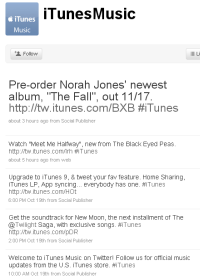This is a guest post by Jennifer Mattern.
Is your company’s social media strategy really working? Could it stand for some improvement? Whether you feel that you’ve maxed out the potential of your current social media efforts or you feel like nothing you do is really helping, it’s time to step up your game.
Now is the perfect time to make changes for the New Year. So why not spice up your social media strategy and make it work even harder for you? Here are five ways you can do just that.
Get Real
Having a company presence in social media is all well and good but it isn’t enough. Your company doesn’t have a personality. You do. Your staff members do. Your customers certainly do. If you really want your customers or other target audience to get (and stay) involved with your business through social media, get real. Show them that there are real people, and real personalities, behind the corporate façade.
Most people don’t just want to talk to a brand image. They want to feel like they’re talking to real people. More importantly, they want to know real people are listening. If you can’t be the public face of your business personally, find someone who can. You might find your audience more willing to pay attention and get involved.

Sell Through Social Media
Do you use social media to solicit or research customer feedback about your products or services? There’s something to be said for social media’s role in market research and more direct connections between consumers and producers. But if you want to ultimately increase sales through your social media efforts, get more aggressive about actually selling.
Is conversation and relationship-building important? Absolutely. But you still have to think about your bottom line. And you don’t have to invade your market’s personal networking space to do it either. Use tools designed for it, and you don’t risk your company’s image too much in the process. After all, most people aren’t on social media services solely to be pitched by you.
Here are a few sites and services that can help you directly sell through social media.
- Groupon.com — Make local offers.
- Foursquare.com — Use Foursquare specials for repeat visitors.
- Twitter.com — Post exclusive coupon codes or deals for followers (just keep offers and actual conversations balanced).
- Facebook.com — Create a social media storefront on your company’s Facebook page using tools like Storefront Social or the Payvment E-commerce Storefront app.
Move from Conversations to More Direct Involvement
Talking to and listening to your customers through social media is a great step. But you can do more. Get your audience more involved by encouraging more direct interactions. That might mean getting them to make a purchase like we mentioned before.
You can get your audience involved in anything from campaign creation to charitable causes. Solicit direct donations or petition signatures. Have customers submit their own online videos or commercials for your products as a part of a contest, directly involving them in creating your next ad campaign. Make people feel like they’re a part of something bigger than some back-and-forth chit-chat on their favorite social network.

Forget About the Sale
I know. I just suggested that you emphasize sales more in your social media plan. Now forget what I said. And forget about the sale. It’s also possible to put too much emphasis on direct sales, missing out on all of the other things social media has to offer.
For example, you might have launched a Twitter account hoping it would drive tons of customers to your e-commerce site quickly. But that’s not how the tool works, especially early on. You need to build a willing audience. You build relationships. You build value in other ways. “Value” doesn’t always have to be directly financial. Many companies neglect the PR side of the social media equation. Don’t be one of them.
Here are a few PR benefits that make it worth sticking to or expanding your social media efforts even if you don’t see early direct sales.
- Social media lets you share news with your audience without going through a middleman.
- Social media helps you build visibility which can lead to later media coverage, expert interview requests for staff, or direct sales down the line.
- Social media tools help you turn one-time customers into repeat customers even if direct sales don’t come from the social media outlets. It might happen after solving a customer’s problem because of a social network complaint, for example.
- Social media increases word-of-mouth when you do something innovative or simply “right.”
- Social media can also mean the opposite — bad reviews spread quickly too. But that makes it even more important to maintain a strong social media presence of your own so you can stay on top of feedback and keep your own news and updates flowing from one user to the next.
- Social media can be an effective tool for crisis response, when handled responsibly. It gives your company a chance to be heard directly rather than having your problems and solutions aired first by someone else.
All of these things have value to a company — some more than others for you. Some might ultimately lead to higher sales, and others won’t. But not every business lends itself well to social selling. Your social media plan will be unique to your business, and just because you’re not seeing direct sales it doesn’t mean you’re doing something wrong. It just means you might need to look at things from a different angle before giving up. Or perhaps you’ve never thought about some of these other benefits of social media tools. In that case, it might be time to incorporate new goals into your social media plan.
Go Offline
When we hear the phrase “social media” we tend to think of the Web and sites like Facebook, Twitter, and Digg. But here’s a chance to set your company apart. Take your social media efforts offline. There’s no reason offline efforts can’t also be social, and sometimes offline efforts even tie to better online sharing and promotion. Here are a few ways you can maintain social relationships in your marketing and PR efforts even off the Web.
- Sponsor a Twitter meet-up or similar event for customers in your local area.
- Reward customers who “check-in” via geolocation services when they visit your offline store.
- Write op-eds or letters to the editor in local or trade publications about industry issues they cover. Be the one giving feedback instead of only receiving it. Yes. Even traditional media has a social aspect. And sometimes these are republished on the Web later where further conversations take place. But it starts with the print publication.
- Offer a discount in-store if a customer mentions they found you via Twitter, Facebook, or another social media service you use.
- Do things offline that encourage people to share your story online. For example, if you run a pizzeria you might get customers together to help you try to break the world record of creating the world’s largest pizza.
No one should try to do everything when it comes to social media. That’s a recipe for disaster because you spread yourself too thin. But you also can’t keep doing the same old thing if your social media strategy isn’t helping you reach your goals. Use these tips to take your social media efforts to the next level, or to at least try something new.
Do you have any ideas for how businesses can spice up their social media strategies? Leave a comment below with tips, tools, and tactics that can help people get more out of social media.
Jennifer Mattern is a professional blogger, freelance business writer, and former PR and social media consultant. She is a regular contributor to DirJournal.com and SocialImplications.com, and she runs a blog for freelance writers at AllFreelanceWriting.com.
Get 30% off any directory entry listed at Directory Journal with coupon code LINK2010. This offer expires on December 20th.
All photos except the SXSW 2008 picture by Shutterstock.





Tamar, thanks so much for publishing our article.
Great list! I like when companies ask me for my opinion/feedback on specific products. Carol’s Daughter has done a great job with this and now I receive more targeted coupons. Frederick’s of Hollywood posts pictures of new items and ask for feedback which is a great way to draw me in and I often share with friends.
Thanks for sharing some specific examples. And you’re a good example of why companies should be interacting with customers in the first place. When they make customers feel listened-to and appreciated, those customers spread the word for them.
I was thinking about the same thing, I would add an “About us” section with out photos and bios. One small step at a time 😉
(as a note, I do not use your email address — or website — for any other reason but to contact you about a problem with your comment. You don’t have to be afraid to share it. It’s only accessible by me.)
I LOVE this! You’ve brought a dose of reality to the pie-in-the-sky, don’t sell or monetize anything viewpoint on social media. I love that social media has completely changed the selling game, but also believe that social media isn’t some new approach, it’s just that ALL media is becoming more social. Spot on!
I’ve always considered that utter garbage. Anyone who says social media as a whole should not be monetized is full of themselves. They don’t see beyond their own discipline, and everyone wants to claim social media as their own. This used to be a big problem in the PR industry for example. They assumed it was all about the conversation. No. It’s all about whatever you want it to be all about. If you don’t want to monetize your own blog, profiles, etc., that’s fine. But to say social media shouldn’t be used that way by anyone is taking it too far.
Social media has many different roles, including:
1. Personal connections
2. PR
3. Marketing
4. Direct Sales
5. A business model in its own right (such as professional blogging)
How people choose to use it is up to them. And as long as there’s nothing unethical about it, that’s really not for anyone else to judge.
And you’re right. Social media is not new. It’s a hyped up buzzword for old concepts and goals mixed with new tools. The fundamentals really haven’t changed.
The off-line strategy sounds awesome! So far 2010 has given rise to location and I expect 2011 will be more into location(niche) with the adoption of location based services like Foursquare and Gowalla
My feeling is that we’re going to see privacy concerns move away from social networking a bit and more to geolocation tools in 2011. So I’m sure we’ll see growth in that area — probably significant. But I’m also reasonably confident that the problems associated with it are going to get a bit more of the spotlight. What will be interesting to me is to see how it plays out and how consumers react to companies using these tools in new ways — whether they embrace it or we see the beginning of a backlash if enough safety-related issues come to light. One of my favorite examples was given by a commenter at the SocialImplications.com blog. They mentioned that they’ve seen mothers check-in at their children’s schools when it’s time to pick them up. When combined with their other social media activity they’re telling people who their kids are, where they go to school, when they get out of school, and in some cases even photos of the children. It’s a recipe for child abductions. And while this is still fairly fresh technology in the grand scheme of things, I think we’re eventually going to see concerns like that play out (due to users’ own stupidity in large part), and I see it having a broader affect on geolocation and how it’s used in the long run.
Some great advice for the new year- particularly appreciate your tip to “move from conversation to more direct involvement.” One of the most powerful features of social media is its ability to call people to action.
Precisely. It’s not enough to talk to people when it comes to using social media for business. This isn’t a case of keeping in touch with friends and family. If you don’t go into it with actual business or organizational goals in mind (sales, sign-ups, signatures, event attendees, registrations, subscriptions, etc.), there’s little point in doing it. Even from the reputation perspective it’s not enough to appear to be listening to consumers. You go much further by actually getting them involved with your company, events, products, or causes.
I’ve been thinking a lot about the ‘off-line’ or ‘real human experience’ (vs. virtual) lately. We’ve all become so consumed with the end-all-be-all Interwebs that I fear we will lose touch with the value of the ‘warm smile/warm body’ interaction. Great piece!
That probably depends on the business. I run a business entirely online for example, with clients all over the world. There’s no face-to-face, but we manage just fine. In my line of work it even allows me to be more productive to keep everything virtual. But if you run a local mom-and-pop shop there’s likely no good online substitute for that one-on-one interaction. For chain stores, I think they need to find a way to balance the too. A strong social media presence won’t make up for employees acting like jerks when you finally get people into your stores.
Excellent advice (and great follow-up discussion), Jennifer. Thanks for the post.
Not a problem. Thanks for your feedback, and I’m glad you enjoyed it.
Some really great tips on optimizing your social media strategy in the coming times. At StormDriver although we are using company names as our Twitter usernames but we are trying to keep our interactions as conversational as possible, but you’re quite right about giving you presence personality people can relate to. It’s like, people would prefer to talk to “Amrit” rather than StormDriver which is basically the company name.
I don’t think there’s any problem with using a company name as a social media handle. After all, people are going to search for your company. They should be able to find you under that name. For example, if I want to follow a Web hosting company to monitor support updates I’m not going to look for their support manager’s account. I’m going to look for the company account. But that also doesn’t stop staff from tweeting independently and making their accounts known. Even with a company name you can give people a personal feel by actually responding to them rather than just posting updates and announcement. It’s more about what you do than what you call yourself, and certain cases call for different approaches to that.
These are great tips and step outside the box; a must in staying on top of things media-wise.
Thanks!
You’re welcome Victoria. I’m glad you enjoyed the post and found the tips useful. 🙂
It’s RM = RM (Relationship Marketing= Real Meaning)
Sell common sense and the dollars and cents will tag along.
Great topic, Tamar. Thanks.
These are great recommendations and will be key to the company’s that have started social channels and need to get to the next level.
One big piece that I didn’t see mentioned much is figuring out a solid content strategy. Helping companies figure out what will resonate with their audience and on what channels can help a lot in getting to that next level, especially when first starting or thinking about “selling.”
We hear all the time, “What content should I be creating for Facebook and Twitter?…”
Excellent tips. I’m going to share some of these with my colleagues tomorrow!
Great post, I especially like the mention on forgetting about the sale, as hard as it is, you sort of have to put it on the back burner when thinking about social media, building the relationship, the trust, that eventually goes much further than hoping to get an immediate sale.
Great tips here! I especially like the tip to “get real”–that’s something that a lot of larger companies have a hard time with. People want to interact with “people,” not just consume your content.
Great article!
very awesome tips that inspiring me. Personally I’m a new in blogging world…
Edited by Moderator: Sorry PressByte, but I ask for your real name when writing a blog comment. You didn’t provide that, so your comment has been edited as stated in the policy. New bloggers aren’t exempt from the rules.
I think the biggest mistake companies make when engaging in social media for the first time is that they lead with their product. They engage with a customer/prospective customer and slap ’em with the hard sell. Instead they should lead with something useful to solve consumer problems (thinking “How To” type posts/tutorials). The sale of the product will then follow.
Broadcast less. Engage more (this is the relationship-building part). Yes it takes time, but the sales will follow.
“Like!” 🙂
Awesome article! Big fan.
Wow! This blog has been so helpful to me as I am self-educating myself in the world of social media and how I can use this to build my own home business. I have freshly closed my “bricks and mortar” print media business and still want to leverage my personal connections/customers and show them how to use and educate them to the newer social media opportunities. Besides following this blog, what are the next steps to becoming more of an expert or a “go to ….” kind of contact?
Linda – I’d say “just do it.” It’s not just about reading but applying the skills to your everyday interactions.
Thanks for this post, we should really make Social Media important to us especially if we are in a business that needs to grow. We need to put our name out there. Communication and engagement with different people that can help us develop what we need are truly significant. 🙂
Thanks for posting this kind of article. highly informative